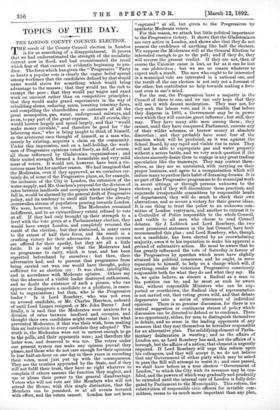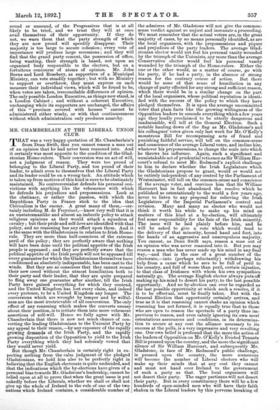TOPICS OF THE DAY.
THE LONDON COUNTY COUNCIL ELECTION. THE result of the County Council election in London is for us something of a disappointment. It proves that we had underestimated the strength of the socialistic current now in flood, and had overestimated the recoil which fear of that current is evidently beginning to pro- duce. The force which has given the" Progressive" Party so heavy a popular vote is clearly the vague belief spread among workmen that the candidates defined by that stupid name would strive for something which would bring advantage to the masses ; that they would tax the rich to exempt the poor ; that they would pay wages and exact work on unionist rather than on competitive principles ; that they would make grand experiments in the way of rebuilding slums, reducing rents, lowering tramway fares, and compelling the shareholders or customers of all the great monopolies, gas, water, underground railways, and so on, to pay part of the great expense. At all events, they would borrow largely and spend largely, and that "would make money circulate," and therefore be good for "the labouring man," who is being taught to think of himself, as the aristocrat once thought of himself, as a man who, merely by existing, acquires a claim on the community. Under this impression, and on a half-holiday, the work- men of Progressive opinions voted freely, as did, of course, all those influenced by Gladstonian organisations ; and their united strength formed a formidable and very solid mass of voters. It would not, however, have been a vic- torious mass but for another reason. We had imagined that the Moderates, even if they approved, as we ourselves cer- tainly do, of some of the Progressive plans, as, for example, the inclusion of the City in London, the extension of the water-supply, and Mr. Goschen's proposal for the division of rates between landlords and occupiers when existing leases fall in, would be alarmed by the general drift of Progressive policy, and its tendency to swell still further the already overswollen stream of population pouring towards London. We were, however, in error. The Moderates remained indifferent, and to an extraordinary extent refused to vote at all. If they had only brought up their strength to a level with the vote given at a Parliamentary election, they would have swept London, and completely reversed the result of the election ; but they abstained, in many cases to the extent of half their force, and the result is a crushing victory for their adversaries. A dozen excuses are offered for their apathy, but they are all a little futile. It is said by some that the Moderates had no programme to carry, which is true, and has been regretted beforehand by ourselves ; but then, their adversaries had, and to prevent that programme from being carried out was, one would have thought, policy sufficient for an election cry. It was clear, intelligible, and in accordance with Moderate opinion. Others say that the absence of a visible leader destroyed enthusiasm, and no doubt the existence of such a person, who can approve or disapprove a candidate or a platform, is essen- tial to organisation ; but then, who is the Progressive leader ? Is it Lord Rosebery, who was not even an avowed candidate, or Mr. Charles Harrison, unheard of until Lord Lingen resigned, or Mr. John Burns ? And finally, it is said that the Moderates were anxious for a division of rates between landlord and occupier, and thought their own candidates might resist that ; but what prevented Moderates, if that was their wish, from making this an instruction to every candidate they adopted? The truth is, the Moderates were not in earnest enough to go to the polls, and their opponents were ; and therefore the latter won, and deserved to win too. The voters under our present system can make any opinion prevail they please, and those who do not care enough for their opinions to lose half-an-hour on one day in three years in recording their votes, must just put up with the consequences. They are the trustees appointed by the State, and if they will not fulfil their trust, they have no right whatever to complain if others assume the function they neglect, and use or abuse their power to the general disadvantage. Voters who will not vote are like Members who will not attend the House, with this single distinction, that the Members can be punished, or at all events lectured with effect, and the voters cannot, London has not been " captured " at all, but given to the Progressives by apathetic Moderate voters.
For this reason, we attach but little political importance. to the Progressive victory. It shows that the Gladstonians.
are very active in London, and shows also that they do not possess the confidence of anything like half the electors. We suppose the Moderates will at the General Election be interested enough to go to the poll ; and if they do, they will reverse the present verdict. If they are not, then of course the Unionist cause is lost, as far as it can be lost in one plebiscitum ; but we see no reason whatever to expect such a result. The men who ought to be interested in a municipal vote are interested in a national one, and the result of the one election is not only not a forecast of the other, but contributes no help towards making a fore- cast even in one's mind.
For the rest, the Progressives have a majority in the Council of three to one, and we can only hope that they will use it with decent moderation. They may not, for they seek the labour vote, and it is possible that before they disperse in 1895, a Government may be in power over which they will exercise great influence ; but still, they may. They have many able men among them ; they cannot, until they have conquered Parliament, execute any of their wilder schemes, or borrow money at absolute discretion ; and they probably have some fear of the reaction which will be produced, as it was against the. School Board, by any rapid and visible rise in rates. They will not be able to expropriate gas and water property without a severe battle, and we very much question if the electors sincerely desire them to engage in any great trading speculation like the tramways. They may content them- selves, as they are so unresisted, with carrying on their proper business, and agree to a reorganisation which will induce many to pardon their habit of dreaming dreams. It is no part of the Progressive programme to do municipal work in secret sittings, or through persons• unknown to the electors ; and if they will discontinue those practices, and supersede irresponsible committees by responsible heads of departments, they will do much to check their own aberrations, and so secure a victory for their graver ideas.. It is one thing to trust the police to an unknown com- mittee of London vestrymen, and another to entrust it to- a Controller of Police responsible to the whole Council, and visible to all men who choose to read Council debates. Sir J. Lubbock and Lord Rosebery, the two. most prominent statesmen in the last Council, have both recommended this plan and Lord Rosebery, who, though. not a candidate, has been elected by an overwhelming- majority, owes it to his reputation to make his approval a, ground of substantive action. He must be aware that he greatly influenced the vote of Saturday in favour of the Progressives by speeches which must have slightly strained his political conscience, and he ought, in mere reparation to himself, to help on a change which will, if anything, render the victorious Progressives consciously responsible both for what they do and what they say. He is, we quite believe, as sincere a Radical as a man in his position can be, and he must as such be aware that, without responsible Ministers who can be sup- ported or overthrown, the Radical idea of representation is not carried out, that voting grows wild, and that debate degenerates into a series of utterances of individual opinions. There is no genuine discussion, for there is no central suggestion or continuous stream of policy which. discussion can be directed to defend or to condemn. There is no opportunity, either, for men to distinguish themselves. in debate, and no sense in the leading opponents of any measure that they may themselves be hereafter responsible for an alternative plan. The solidifying element of Parlia- mentary deliberation is wanting ; and as the affairs of London are, as Lord Rosebery has said, not the affairs of a, borough, but the affairs of a nation, that element is urgently required. If Lord Rosebery will urge this reform upon his colleagues, and they will accept it, we do not believe that any Government of either party which may be asked to pass the Bill will attempt to resist it ; and once passed, we shall have before us a true elective "Government of London," to which the City with its revenues may be con- fided, and the powers of which may gradually and prudently be extended until the internal care of London is fully dele- gated by Parliament to the Municipality. This reform, the substitution of responsible civic officers for invisible com- mittees, seems to us much more important than any plan. sound or unsound, of the Progressives that is at all likely to be tried, and we trust they will at once avail themselves of their opportunity. If they do not, we warn them that the party strength of which they are now proud will speedily disappear. Their majority is too large to secure cohesion; every vote of importance will produce large secessions ; and they will find that the grand party cement, the possession of office, being wanting, their strength is based, not upon an organised body responsible to the electors, but on a fortuitous concourse of atoms of opinion. Mr. John Burns and Lord Rosebery, as supporters of a Municipal Ministry, can vote steadily together ; but with no Ministry to support or overthrow, they must express on each measure their individual views, which will be found to be, when votes are taken, irreconcilable differences of opinion. The only possible London Executive, as things now stand, is a London Cabinet ; and without a coherent Executive, unchanging while its supporters are unchanged, the affairs of this "province covered with houses" cannot be administered either wisely, or with that continuousness without which administration only produces anarchy.



































 Previous page
Previous page